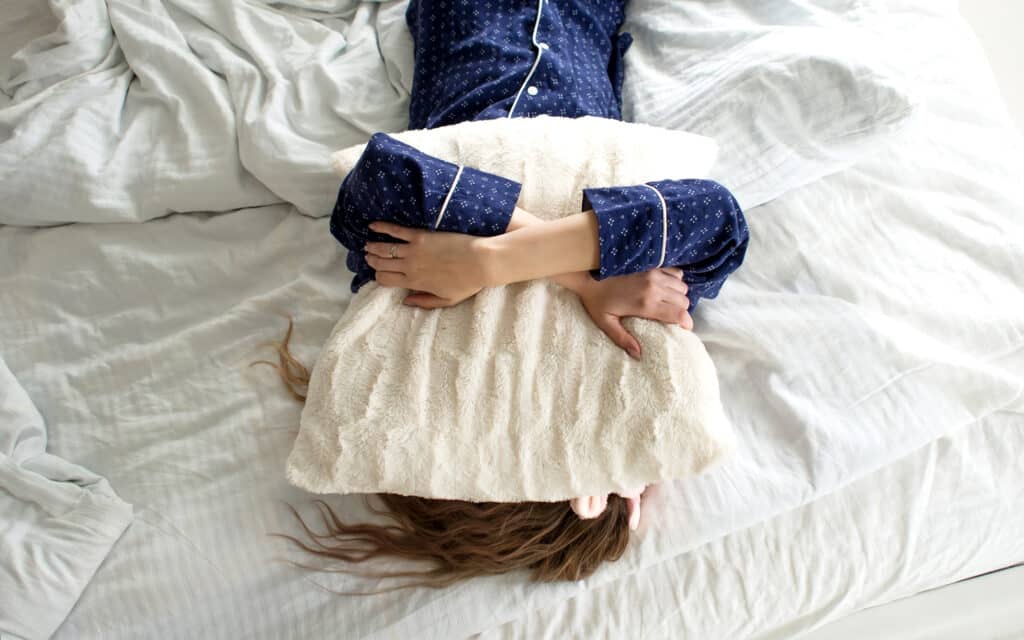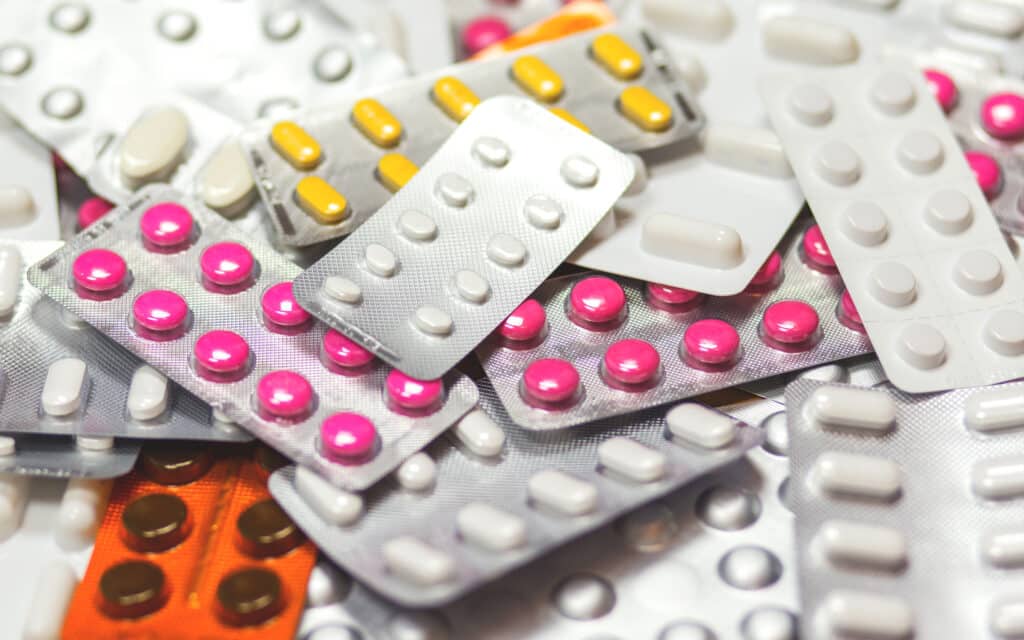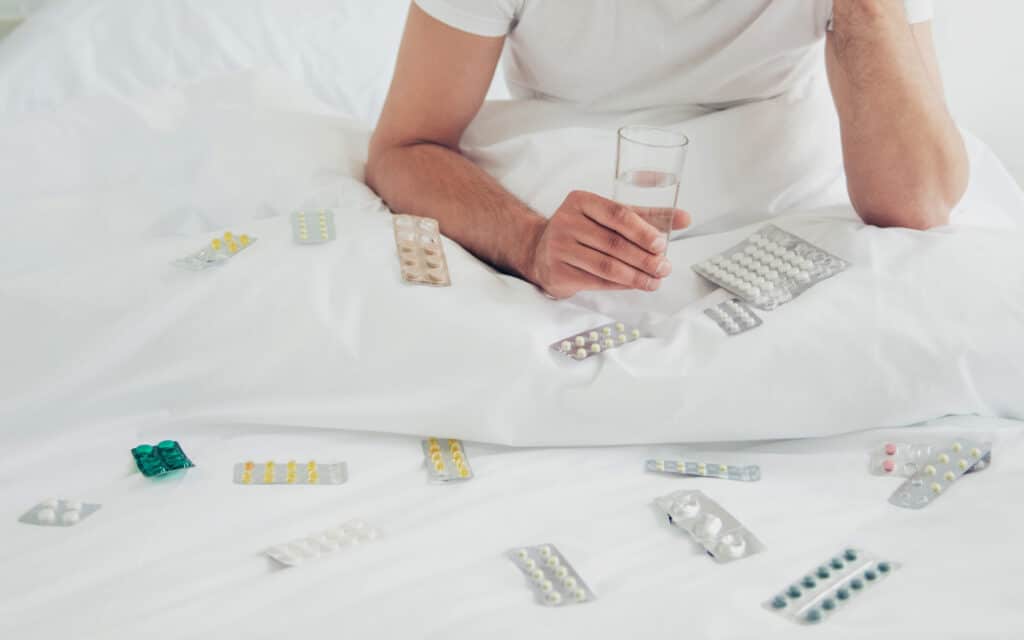Trouble sleeping?
You’re not alone.
Countless people today have a hard time drifting off to sleep. Often, problems of insomnia are caused by everything from chronic pain and discomfort, to issues with anxiety.
Unfortunately, the complicated nature of insomnia means that finding the right treatment is easier said than done.
For instance, depression and sleep problems often go together hand-in-hand.
If you often feel down or overwhelmed by negative emotions, it’s hard to achieve the feeling of relaxation required for a good night’s sleep.
However, many of the medications used to treat depression can add to your sleep problems.
Sleep deprivation and depression issues are closely linked. Insomnia is a common side effect of many antidepressants. Because of this, your doctor or sleep expert have to consider the choice of medication very carefully.
Here, we’re going to look at the antidepressants used for sleep support and emotional wellbeing.

The connection between antidepressants and sleep
So, how closely connected are antidepressants and sleep?
Well, to understand that, we need to look at the link between sleep and depression, or psychological illnesses.
To fall asleep each night you need to be more than just tired. Your sleeping experience is a very fragile thing. It can be disrupted by anything from anxiety to feelings of hunger, discomfort, or pain.
Feeling depressed is a very common cause of insomnia. It’s why many people turn to exercise and meditation to help clear their mind before they go to bed.
Additionally, the less you sleep, the more likely you are depressed. When you’re sleep-deprived, one of the significant symptoms you’ll experience is an inability to control your emotions.
Sleep deprivation makes your amygdala (the part in your brain responsible for managing emotions and survival instincts), become hypersensitive.
That means you can respond more aggressively to all kinds of stimuli, leading to dramatic negative emotions.
According to some studies, the sensitivity of the amygdala is a main factor in causing people with insomnia to have a ten times greater risk of developing depression.
The more depressed you feel, the more symptoms of sleep disorders you’ll experience.
These including difficulty staying asleep, falling asleep, and getting the right quality of sleep. What’s more, obstructive sleep apnea is also linked to depression.
One study into 18,980 people found that people with depression were five times more likely to suffer from breathing disorders in their sleep.
Clearly, there’s a significant overlap between sleep deprivation and depression.
Because sleep and depression are so deeply connected, you might assume all depression medications would be suitable to support both mental health, and sleep disorders.
However, there are only a handful of antidepressants that help with sleep and anxiety at the same time.
Antidepressants and sleep disorders often have a negative connection. Many of the leading antidepressants used today come with side effects that worsen your sleeping patterns.
Antidepressants that help with sleep and anxiety
When you speak to a doctor or psychologist about treatment for your mental health and sleeping conditions, it’s important to ensure that they understand that both your sleep and your emotions need help.
Sometimes, your doctor will recommend using drugs that will restore your sleep before you begin using antidepressants. It could clear up just how severe your depression is.
The sedative sleeping medications are often used alongside psychotherapy and cognitive behavioural therapy.
You will be advised to use these sleeping pills for a very short period of time, as they are highly addictive.
If your doctor chooses this route, it’s usually because they want to get to the root cause of your depression, before prescribing long-term medication.
Additionally, it’s important to take into account the existence of sleep disorders alongside a depression. Treatment for depression is often complicated by these.
For instance, if you have depression and problems with sleep apnea at the same time, you’ll need to avoid sedating antidepressants. They can supress your breathing.
What’s more, selective serotonin reuptake inhibitors, the most common choice for depression treatment, are often the worst for those with insomnia.
Otherwise known as SSRIs these medications can improve mood in many conditions. However, they also create insomnia, making them unfit antidepressants for sleep.
On the plus side, there are some antidepressants used for sleep and depression that can work to address both issues at the same time.
One option is to try one of the tricyclic antidepressants. Tricyclic antidepressants are good for those who need help with sedation. The sedation helps you fall asleep and stay asleep.
However, TCAs can cause side effects, including high blood pressure, weight gain and dryness in the mouth.
There’s no one-size-fits-all treatment. Your doctor will need to monitor you closely to determine which antidepressants help you sleep and address your emotional issues at the same time.

Which antidepressants help you sleep?
The complex relationship between antidepressants and sleep means that it can often take some time before you find the right treatment. Doctors will sometimes start by giving you an SSRI medication and see how you respond.
If you’re struggling with sleep anxiety, then some SSRIs may help you to feel calmer about going to bed, particularly when they’re combined with over-the-counter sleep aids and meditation.
SSRIs include citalopram, paroxetine, and fluoxetine and others.
SNRIs, or serotonin and norepinephrine reuptake inhibitors, may be a better option when SSRIs are deemed unsuitable.
Drugs like Venlafaxine, Duloxetine, and Desvenlafaxine are commonly used when depression comes with other symptoms like anxiety or pain disorders.
SNRIs can sometimes be better antidepressants used for sleep anxiety and other sleep disorders.
The most common choices for treating both sleep deprivation and depressions are tricyclic antidepressants(TCAs). This group includes Nortriptyline, Amitriptyline and Trimipramine and others.
Your doctor may also suggest sedating antidepressants like Silenor, Trazodone, and Mirtazapine.
However, it’s worth noting that antidepressants used for sleep can make you feel drowsy during the day.
If you’re worried about having trouble concentrating, you can ask your doctor about combining daytime and nighttime medications.
Also try daily exercise and treatments like yoga to help you overcome side effects.
Are antidepressants used for sleep getting better?
For a long time, it was only the TCAs that helped with sleep and depression at the same time. However, as researchers have learned more about the connection between antidepressants and sleep, we’re seeing the arrival of other options on the market.
For instance, in the category of antidepressants that help with sleep and anxiety, a relatively novel option has appeared.
They have a dual action, both as a noradrenergic and a serotonergic antidepressant, therefore named the NaSSAs. Mirtazapine is one of these drugs.
Mirtazapine may be particularly useful for those with depression and sleep disorders because it helps with sedation at night.
However, like many sedating antidepressants for sleep, mirtazapine can cause feelings of exhaustion during the day, especially in the beginning.
Though depression and sleep are often closely connected, there’s still a lot of work to do before scientists and medical professionals find the perfect solution to cure both issues at once.
In general, antidepressants have a habit of suppressing REM sleep and making it harder for you to enter REM sleep.
This means that when you’re medicating for depression, you might have more problems overcoming your sleep disorders.
The few medications that are available for those in search of antidepressants used for sleep often cause drowsiness. When sedation side effects that aren’t limited to the evenings, you may struggle with staying focused when you’re using these drugs.
There’s not always a magic medication for sleep and depression. That said, you can be one of the people who have excellent effect of the drugs and get your life back on track.

What’s the right treatment for sleep deprivation and depression?
If you’re suffering from depression and sleep disorders at the same time, the best thing you can do is speak to your doctor.
Some people will find that beginning treatment for depression, with things like cognitive behavioural therapy and antidepressants, will help their sleep to improve.
As you feel happier and more relaxed, you’re more likely to fall asleep. Additionally, when you get used to your depression medication, you can begin to fall into a routine that’s good for sleep hygiene.
Many doctors will also recommend other treatments alongside your depression medication, such as exercises that you can use to encourage better sleep or meditation.
When you begin to overcome your depression, you may find that your sleep improves as a natural side effect.
On the other hand, if your insomnia is the cause of your depression, then your doctor will likely want to focus more specifically on your sleep disorders.
You might be asked to take part in a sleep study that highlights the cause of your issues.
Once you’re better rested, you can begin trying things like therapy and counseling, before gradually using medications to assist with your depression.
To learn more about medical treatments for sleep disorders, check out some of our other guides:
—Is Mirtazapine or Trazodone better for insomnia?
—Does Amitriptyline help you with sleepless nights?
—Quetiapine as a short term medical sleep solution
—Are tricyclic antidepressants an insomnia cure?
Siestio. Sleep Matters.
Medical disclaimer
You must not rely on the information provided on our website as an alternative to medical advice from your doctor or other healthcare professionals. For more information read our full disclaimer here.







